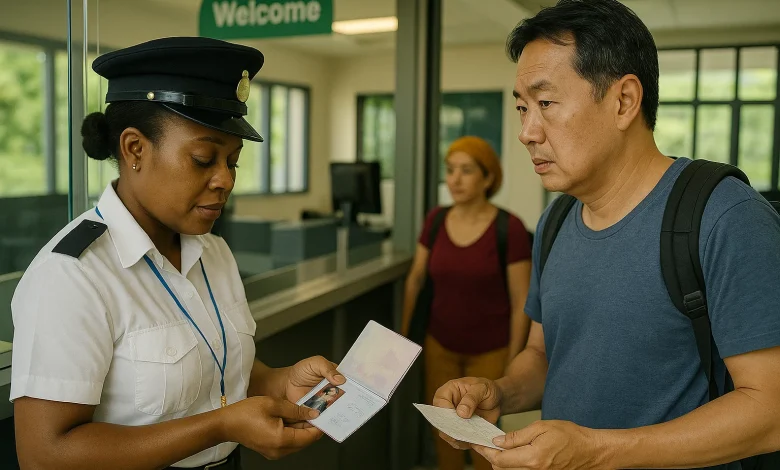Immigration in Dominica: Laws, Policies, and Procedures

Immigration in Dominica is governed by a combination of national laws, administrative regulations, and international obligations that define who may enter, reside, work, or naturalize on the island. As a small Caribbean state with a population of around 70,000, Dominica balances the movement of people with its economic needs, security interests, and commitments to regional and global agreements. Immigration remains closely tied to labour market conditions, family ties, investment initiatives, and the constitutional framework of citizenship.
Historical and Legal Framework
Immigration laws in Dominica are anchored in several Acts that collectively establish rights, obligations, and penalties. Among the most important are the Immigration and Passport Act, the Aliens Landholding Regulation Act, and the Labour Contracts Act. These provide the basis for regulating entry, residence, work, and property acquisition. The Constitution of Dominica also contains provisions related to citizenship and residency, particularly in defining nationality at independence in 1978.
The Immigration and Passport Act lays out the procedures for visas, entry permits, work permits, and deportation orders. It empowers immigration officers to control borders, enforce compliance, and facilitate lawful entry of visitors, investors, and workers. The Act is complemented by the Protection of Employment Act and the Labour Standards Act, which safeguard workers’ rights once legally employed in Dominica.
Internationally, Dominica is part of the Caribbean Community (CARICOM) and the Organisation of Eastern Caribbean States (OECS). These memberships create a regional framework where citizens of CARICOM states enjoy facilitated movement under the CARICOM Single Market and Economy (CSME) regime, while OECS nationals benefit from free movement provisions across member states.
Immigration Policies and Residency Categories
Immigration policy in Dominica is managed by the Ministry of National Security, working with units under the police service and the Labour Division of the Ministry of Labour. Several categories of residence are recognized:
- Short-Term Visitors: Tourists and business travelers are granted temporary entry, often visa-free for citizens of Commonwealth countries, the European Union, CARICOM, and others.
- Work Permit Holders: Foreign nationals employed by Dominican companies must obtain a work permit through the Labour Division.
- Permanent Residency: Granted to individuals who have legally resided in Dominica for at least five years and who can demonstrate financial stability, good character, and contributions to the community.
- Naturalized Citizens: Individuals may apply for naturalization after seven years of continuous residency, subject to language, character, and allegiance requirements.
- Citizenship by Investment (CBI): Established under the Citizenship by Investment Regulations, this program provides citizenship in exchange for significant financial contributions to the state, either through the Economic Diversification Fund or approved real estate projects.
Immigration Procedures
The immigration process in Dominica involves multiple steps depending on the applicant’s category:
Entry and Short Stay:
Most visitors require only a valid passport and, in some cases, a visa. Immigration officers issue entry permits at ports of entry, typically valid for up to 90 days, with extensions possible.
Work Permits:
Foreigners seeking employment must submit an application to the Labour Division using the relevant forms (Form L.I. 01 & 07 for new and renewal applications). Employers must justify the hiring of a non-national by demonstrating that the role could not be filled by a Dominican citizen. Fees are assessed based on occupation type and permit duration, and renewals must be submitted before expiry.
Permanent Residency:
Applicants must show continuous residence in Dominica for at least five years, a clean police record, proof of income, and contributions to the community. Residency is subject to ministerial approval, and successful applicants receive a residency certificate.
Naturalization:
The process of naturalization requires at least seven years of continuous residency, fluency in English, and evidence of integration into Dominican society. Applicants must take an oath of allegiance and are then eligible for a Dominican passport.
CBI Programme:
Under the Citizenship by Investment Unit, applicants undergo a due diligence process, including background checks, financial audits, and interviews. Successful applicants receive citizenship within three to six months.
Immigration and the Workforce
Immigration intersects directly with the Dominica labour market and labour force. While the country maintains a relatively small workforce of approximately 54,000 persons, immigration plays an important role in filling critical skills gaps. Foreign professionals work in healthcare, education, and technical trades, while seasonal migrant labourers support agriculture and construction.
CARICOM and OECS agreements encourage labour mobility within the region. Nationals of these blocs can enter and work in Dominica with fewer restrictions, subject to recognition of skills certificates. This regional framework reduces reliance on distant foreign labour while encouraging integration of Eastern Caribbean economies.
Challenges and Future Directions
Immigration in Dominica faces several challenges. Brain drain remains significant, with many skilled nationals emigrating, especially nurses, teachers, and technicians. This creates demand for foreign workers, complicating labour market balance. Informal employment and overstaying also strain regulatory enforcement.
Climate change and natural disasters affect immigration patterns by disrupting livelihoods and creating temporary surges in migration for reconstruction projects. At the same time, Dominica’s Citizenship by Investment programme has drawn global scrutiny regarding transparency and due diligence, prompting recent reforms to tighten standards.
The government continues to refine immigration policy to align with the National Resilience Development Strategy 2030, emphasizing sustainable growth, resilience to disasters, and human capital development. Immigration will remain a critical tool in meeting workforce needs, attracting investment, and fostering cultural diversity.




